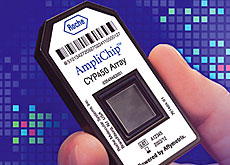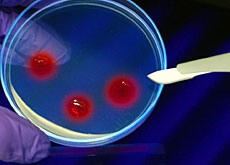Tailored drugs risk leaving the poor untreated

A test designed to predict an individual’s reaction to medicinal drugs was introduced in Switzerland this month, heralding a new era in personalised medicine.
Pharmacogenetic tests, pioneered by the Swiss drug firm Roche, promise more effective and safer treatments, but the implications are not all therapeutic.
Despite incredible progress made in recent decades, medicine remains anything but an exact science. New drugs coming onto the market generally have a success rate of between 70 and 80 per cent.
“Try this drug and we’ll see if it works,” is the classic approach adopted by doctors, who are constantly plied with new products to “try out” on their patients by the pharmaceutical companies.
But this approach can have dramatic consequences: in the United States, for example, two million people are hospitalised each year, and 100,000 die, as a result of adverse reactions to drugs – even if they were administered in the correct way.
Lethal
While a particular drug may be harmless to one person, to another it may prove lethal. Moreover, patients who do not respond to a particular drug may deteriorate because of delays in finding an appropriate course of treatment.
Modern science attributes the different reactions to minute variations in humans’ genetic make-up. Researchers describe these variations as “snips” (single nucleotide polymorphisms), of which there are some three million in the basic molecules of the human genome.
This is the province of pharmacogenetics, the science which studies the genetic factors behind differing reactions to drugs. A related discipline is pharmacogenomics – the development of drugs that take into account the specific genetic characteristics of individual patients.
“Until now, the medical approach has simply been to administer a drug and wait for the body’s reaction,” explains Barbara Stähelin, head of Roche’s patents division.
“In future, it will be possible to predict individual reactions to particular drugs, enabling us to prescribe the right drug and the appropriate dosage for each person.”
Tolerance
Last year, Roche launched the world’s first pharmacogenetic test in the United States, enabling doctors to predict their patients’ tolerance to dozens of medicinal drugs, including analgesics, anti-depressants, beta-blockers and anti-malarials.
The tiny chip involved costs SFr600 ($473). Used to analyse a sample of saliva, it tells the doctor whether the patient’s liver will be able to metabolise a particular drug in the normal way – or whether it will do so too quickly or too slowly, with potentially lethal consequences.
“This is not a crystal ball for predicting the future, given that the side effects of a medicine may also depend on a person’s lifestyle and on environmental factors. But it does open up new horizons,” claims Stähelin.
These pharmacogenetic tests are a step towards the “personal medicine” of the future.
Implications
Some possible implications of the new science were revealed in a study – “Pharmacogenetics and Pharmacogenomics” – presented this week by TA-Swiss, the body appointed by the Swiss government to assess the impact and consequences of new technologies.
“Now that these pharmacogenetic tests are being introduced in Switzerland, it will be necessary to plug many legal loopholes if the interests and dignity of patients are to be preserved,” observes Klaus Peter Rippe, who was responsible for the study.
A key consideration is data protection – restricting access to databases containing individuals’ biological material or genetic profiles.
Klaus Peter Rippe says this is essential because a pharmacogenetic test can reveal not only a person’s genetic dysfunctions and predispositions to illness, but also those of his or her family members.
Discrimination
“There is a very real risk of discrimination on the part of employers, health insurance schemes and so on,” he insists.
In addition, every patient should have the right – if they wish to exercise it – not to be informed of the results of a test, so they do not have to live with the anxiety of one day contracting a particular illness.
The potential costs to a country’s healthcare system are also worrying. More personalised forms of medicine are likely to lead to greater fragmentation in the drugs market and of the treatments available, hugely increasing the cost of health services.
For pharmaceutical firms, the cost implications are more complicated. At present, just a few cases of serious intolerance are sufficient for a drug to be permanently withdrawn from the market, representing a loss of hundreds of millions of francs in research and development costs.
If drugs can be targeted more effectively, this may avoid such problems. But on the other hand, tailoring drugs to individuals could stretch research budgets to the limit.
Finally, there is the danger that new medical technologies, and pharmacogenomics in particular, will further widen the “healthcare gap”, marginalising social groups and entire countries which represent a less interesting potential market.
swissinfo, Armando Mombelli
The human genome is 99.9% identical in every person.
Pharmacogenetics identifies how a particular person will react to a certain type of drug.
Pharmacogenomics develops appropriate drugs based on this information.
Roche has developed the first pharmacogenetic test for predicting an individual’s reaction to the most commonly used drugs.
The test is conducted using a tiny chip (AmpliChip CYP450) to analyse a sample of saliva. It costs SFr600.
Launched in the United States in 2003, it became available in Switzerland and the European Union in September.

In compliance with the JTI standards
More: SWI swissinfo.ch certified by the Journalism Trust Initiative



You can find an overview of ongoing debates with our journalists here . Please join us!
If you want to start a conversation about a topic raised in this article or want to report factual errors, email us at english@swissinfo.ch.